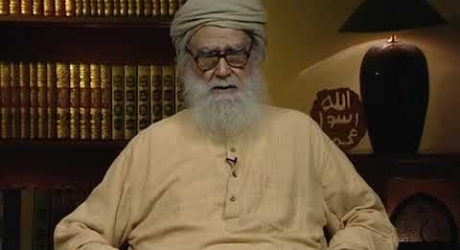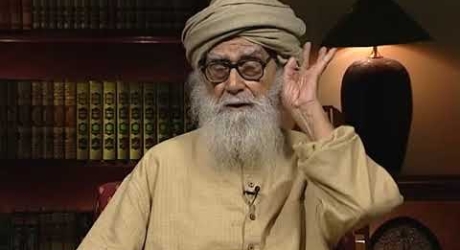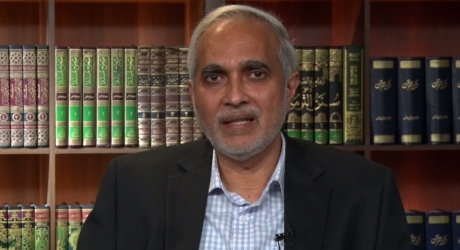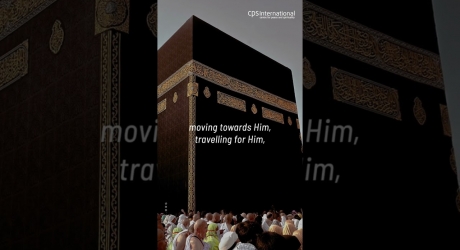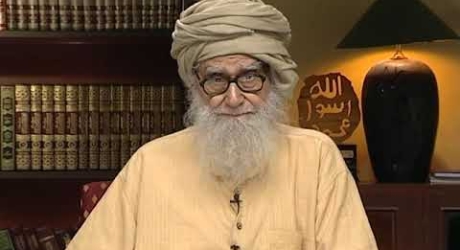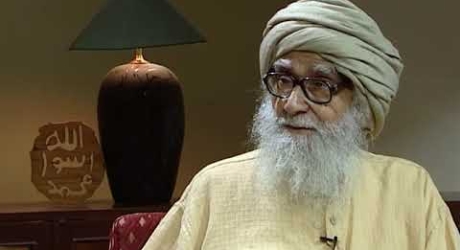Fasting in the month of Ramadan is a living creative process. Fasting aims to make man’s life a roza-oriented life. The purpose of fasting is to make one cautious in life (2:183) and to make one thankful to God (2:185). The spirit of Ramadan is abstinence, to put a curb on one’s desires. During the month of Ramadan one abstains from one’s desires like thirst and hunger as per compulsion, to learn to put a curb on other desires as per our intention. A person trained in this way starts leading a disciplined life by one’s own decision. Symbolically speaking, the position of fasting is akin to applying brakes to the engine in one’s life. Brakes keep the engine of a vehicle in control. Without brakes in the engine, the vehicle will not work properly. The same is the case of fasting in the life of a believer. The fasting of that person is real fasting for whom fasting becomes akin to applying brakes as far as forbidden things are concerned in the eyes of God. Man should accord the place of brakes to fasting in his life so that he may travel successfully on the path of God.
Introduction
Today is the first day of fasting of the month of Ramadan. The date according to the Hijri calendar is 1, Ramadan 1430.
The word used for roza or fasting in the Quran is Saum. The verse is as follows:
“Believers, fasting has been prescribed for you, just as it was prescribed for those before you, so that you may guard yourself against evil.” (2:183)
The word saum means abstinence or restraint. During the month of Ramadan, those fasting abstain from eating and drinking. However, the abstinence is not from eating and drinking alone but also from speaking excessively. In the tradition of Jews, there was a commandment of keeping a fast of silence. This is there in the Islamic Shariat as well. And those who speak a lot even after observing roza do not actually observe the roza.
What is abstinence?
Abstinence is not for the sake of abstinence. Abstinence is a means of reducing our involvement in the worldly distractions. For example, during this month, the intake of food is reduced by eating only before sunrise and after sunset and remaining without food in the period between the two. In the same way we take less rest. Also, speaking has to be reduced as somebody has rightly put it as, “When I am speaking, I am not thinking.”
The following verse in the Quran make a mention of he fast of silence that was observed by Hazarat Mariam:
“I have vowed a fast [of silence] to the Gracious God, and will not speak with any human being today.” (19:26)
To abstain therefore indicates that one must save oneself from all distractions of the world and concentrate one’s thoughts on remembering God alone. The importance of contemplating is made clear from the reference of Sahabas as ‘As Sahab-e-marefat’ (one who discovers God).
Purpose of Roza
It took almost 15 billion years for matter to convert into life and for the present world to come into being. However, Prophet Moses’ staff got converted into a snake in an instant. In the former case, mater got converted into life after 15 billion years while in the latter case it took no time. Why was there this difference? Why did God take such a long time to create the present world?
God created this universe in so long a time and not instantly for man to think on its creation. So, that man may ponder over the laws of creation of the universe and activate his thinking. Man does not achieve anything if he doesn’t contemplate over the external world and discover God. (man was created to discover God through marefat. ).
The month of Ramadan is meant for developing our thinking process and roza aims at activating the thinking of man by detaching his mind from worldly activities. Our entire life is meant for contemplation and the month of Ramadan, during which we detach and think, is the bare minimum of what should ideally be done throughout our lives.
Instead of detaching themselves, Muslims engage far more in worldly distractions during the month of Ramadan. They decorate their mosques, announce on loudspeakers and celebrate during this time when they should abstain from such distractions and spend time thinking or contemplating about God.
People often say that since the Arabs (during the time of the Prophet) lived in a desert, which has meagre resources, hence they were asked to fast. This notion is absolutely wrong. Fasting was enjoined for all communities which came previous to Prophet Muhammad. Roza is not related to any particular community or any particular place; rather, it is meant for developing one’s thinking process or increasing one’s marefat and hence it is enjoined upon everyone.
The core purpose of roza is to develop taqwa in man. The literal meaning of taqwa is ehtiyat that is, being mindful or saving oneself from that which is harmful. And it is not only the material things that may do us harm but more so the negative psychology which has a direct bearing on our personality.
Quran was revealed in the month of Ramadan
The revelation of Quran began in the month of Ramadan. This is explained in the following verse of the Quran,
“The Quran came down in the month of Ramadan.” (2:185)
This verse gives us a reference point to understand that Quran is not revealed for mere recitation but for study. This is because a considered study of the Quran enables one to understand that it is reason-based and not mysterious. The rational basis of the Quran becomes known only after carefully reflecting upon it. The Quran says of itself,
“Quran was sent down with clear proofs of guidance.” (2:185)
This is to say that the arguments of the Quran are reason-based and if we ponder or think over them we’ll discover the reasons offered for the ideology of Islam. A Hadith says this about the Quran,
“Some of the teachings of the Quran are in the lines while others are in between the lines.” (Mishkat)
That is, certain verses of the Quran can be understood directly while, certain others require deep pondering. For example, consider the following verse,
“True believers are those whose hearts tremble with awe at the mention of God.” (8:2)
This verse arouses the question that why would one tremble shiver with fear upon reading the Quran? The underlying meaning is that those who would understand things deeply would be the ones who would shiver. To give an example, thinking on the lines of the above verse, one may start pondering upon the creation of the Creator. This would lead him to realize that the whole universe in actual fact is standing without any pillar. This has been conveyed in Quran as:
“It was God who raised the heavens with no visible supports.” (13:2)
In the traditional period, people knew things as a matter of belief. But today in the scientific age, telescope and other means of knowing the space have been discovered and we know that the universe is indeed unimaginably large and unending. The very thought that every building has a foundation, while the universe has no foundation or pillar makes a person shiver as he discovers the glory of God.
Laila-tul-Qadr (The Night of Destiny)
The Quran was revealed in one of the last nights of the month of Ramadan. This night is called Lailatul Qadr or the Night of Destiny. The Quran says of this night,
“The Night of Destiny is better than a thousand months.” (97:3)
Once Hz. Ayesha asked the Prophet what she should do when she found herself in this night. The Prophet replied, “One should say,
“‘O! God you love to forgive, You are forgiving so please forgive me too.”(Al-Bukhari)
Thus in Lailatul Qadr, we shouldn’t ask for worldly things, but for God’s forgiveness. Forgiveness from God is the greatest thing to be asked for.
Observing the fast
Every year there is a debate on whether Ramadan starts on actually seeing the moon or without seeing the moon. According to the Hadith,
“See the moon and then observe the fast.” (Al-muattah)
While it is said in the Quran,
“Whoever of you is present in that month, let him fast.” (2:185)
It is important to note here that Quran does not talk about viewing the moon. And this is very much validated by the modern day scientific advancements that allow that prediction of the month of Ramadan fairly accurately by using mathematical calculations and astronomical observations. Seeing the moon therefore is no longer required.
The study of Quran in the month of Ramdan is advised so that one can contemplate over the thoughts in a least distracting environment. Doing so unleashes before us the right plan to lead our lives in this world. Cited below are some principles that I have been able to decipher from my study of the Quran.
Principle of differentiation
Quran states,
“Quran was sent down with the criterion by which to distinguish right from wrong.” (2:185)
The word ‘Furqan’ in this verse is used to connote the means to distinguish or the criterion for differentiation between two. The confusion seen everywhere is a result of the lack of understanding of this principle of differentiation. Thus, the principle of differentiation given by the Quran becomes very important but there is nothing mysterious about it. The rationale is that a careful study of the Quran develops us intellectually and this gives us furqan that enables us to differentiate right from wrong.
God desires ease for you
The following verse of the Quran says,
“He who is ill or on a journey shall fast a similar number of days later on. God desires ease for you, not hardship.” (2:185)
This verse gives the provision to one who is sick or is travelling to skip the roza in such a condition and observe it later when his situation is favourable. This principle is known as taeseer in Arabic. It means ‘to make things easier.’ But present-day Muslims think that establishing Islamic law is a necessity or essentiality. However, this is wrong and not applicable everywhere. Consider, for example,
The same verse further says,
“so that you may glorify Him for His having guided you and so that you may be grateful to Him.” (2:185)
The Arabic word for ‘grateful’ is ehtraaf. We have to experience this ehtraaf or acknoweldgement during Ramadan. According to a Prophetic tradition, once when he broke his fast, he said,
“Pyas chali gayi, ragein tar ho gayin.” (Abu Dawud)
This is an expression of thankfulness to God form a man who had observed a whole day’s fast and after he became like dried wood, God refreshed him as he drank water and broke his fast. Such acknowledgement can find words only when man remembers and thanks God at all times.
But more often than not, people live in complaint. They have negative feelings for others, because of loss of property, business etc. We cannot develop the spirit of acknowledgement along with a negative psychology. So we must think and discover that which God has provided for us – something which is far greater than the little which people can deprive us of like the free supply of oxygen, sunlight, water and numerous other resources. On realizing this we come to ignore what people are depriving us of as it is belittled in front of all that we are already receiving from God. During Ramadan we inculcate this spirit of acknowledging God.
God is near
Observing the fast develops in us a heightened consciousness and spirituality. This enables us to attain a feeling of being near to God (also referred to as qurbat). This is the point of making a true dua. According to a verse in the Quran, God says to the Prophet,
“When My servants ask you about Me, say that I am near.”(2:186)
It is very important to understand the significance of dua. Dua is not merely meant to seek material things but to seek guidance from God. This is conveyed in the following Quranic verse:
“I respond to the call of one who calls, whenever he calls to Me: let them, then, respond to Me, and believe in Me, so that they may be rightly guided.”(2:186)
Once the scholar Ibn Taimya was reading the Quran and could not understand a particular verse of the Quran. He then read Namaz prayed to God saying, “I seek guidance from the One Who guided Abraham, guide me.” Therefore, being an expert in Arabic language does not suffice, one needs to supplement the knowledge with contemplation and sincere dua so as to be able to understand the meaning of the Quran in the complete sense of the word.
Managing problems at home
We often hear of problems associated with married life. In giving the formula for managing such issues, the Quran says,
“Husband and wife are like a garment for one another.” (2:187)
The above verse means that the husband is closest to his wife and vice versa. It’s known through studies in biology and psychology that women are emotional by nature. A woman therefore, tends to get angry even on small issues. When she becomes angry, her emotions burst out.
Because her husband is closest to her [like a garment], she releases it all on her husband. The husband in such a case should show forbearance. He should know that she is doing so because of her emotional nature and so he must avoid any kind of retaliation. This would enable us to manage most of the issues that become a problem due to our negligence and reactive nature.
Spirit of Seclusion (or Ihtikaaf)
In order to be effective, Roza should be observed with the spirit of Ihtiqaf or seclusion. This spirit is in the sense of saving ourselves from any distraction and allowing us to concentrate on grave issues concerning our existence. It also prescribes the limits that we must adhere to under all circumstances. Conveying this, a Quranic verse states:
“These are limits set by God, so do not approach them.” (2:187)
A very apt explanation of the above verse is in the form of an example from the tradition of Mishkat. According to this, a believer should be like a horse tethered to one corner of the house. It moves only as much as the rope allows it to. Similarly, man is tied with the rope of accountability towards God. The choice is to opt for the right course or be cast to eternal damnation.
Rightful living
Quran states two ways of living and leaves it upon man to choose the right path. According to the following two verses in the Quran:
“and he will enter the blazing flame. He used to be happy with his own people.” (84:12-13)
“Before this, when we were among our families, we were full of fear of
God’s displeasure.” (52:26)
The above verses connote that those who stay happy while with their family will go to hell because they become oblivious of God and His blessings, while
Conclusion
All these teachings can be derived only when Quran is analysed thoroughly. Therefore, Ramdhan is the month of thinking and activating our intellect so that it can learn to differentiate the right from the wrong.
God has bestowed his blessings all around us but it is only by way of being thankful that we can acknowledge the favour of God. But if we continue to live in a psychology of complaints, we will never be able to live with the spirit of gratitude. Moreover, in lieu of the less than one percent that may have been taken away from us, we would end up not acknowledging our Benefactor who has provided for more than ninety nine percent of our requirements.
Therefore, it is very important that we make full use of this opportunity and increase our consciousness to the level required to realise God. In a verse, the Quran says:
“surely in the remembrance of God heart can find comfort.” (13:28)
May God accept our prayers!





